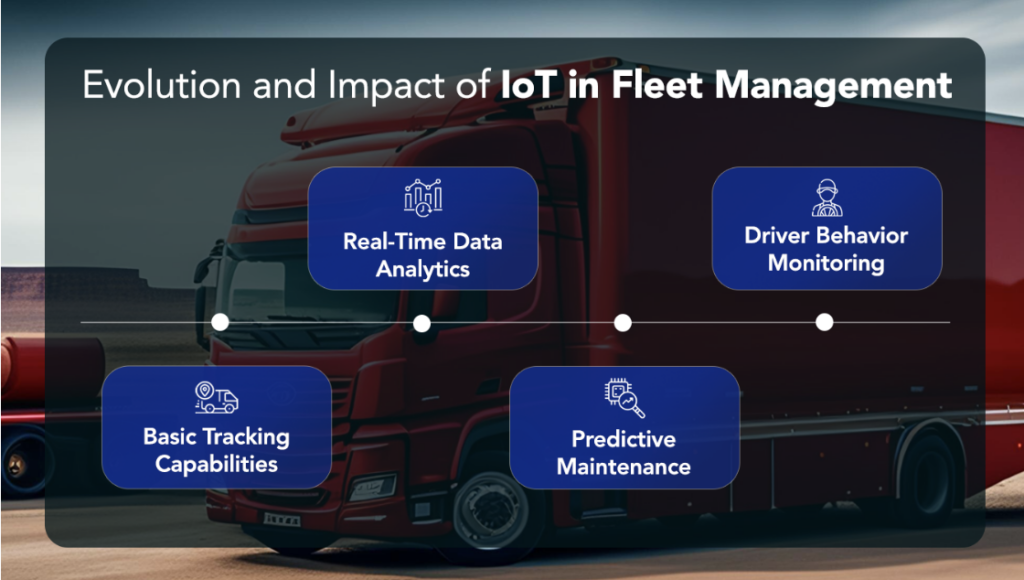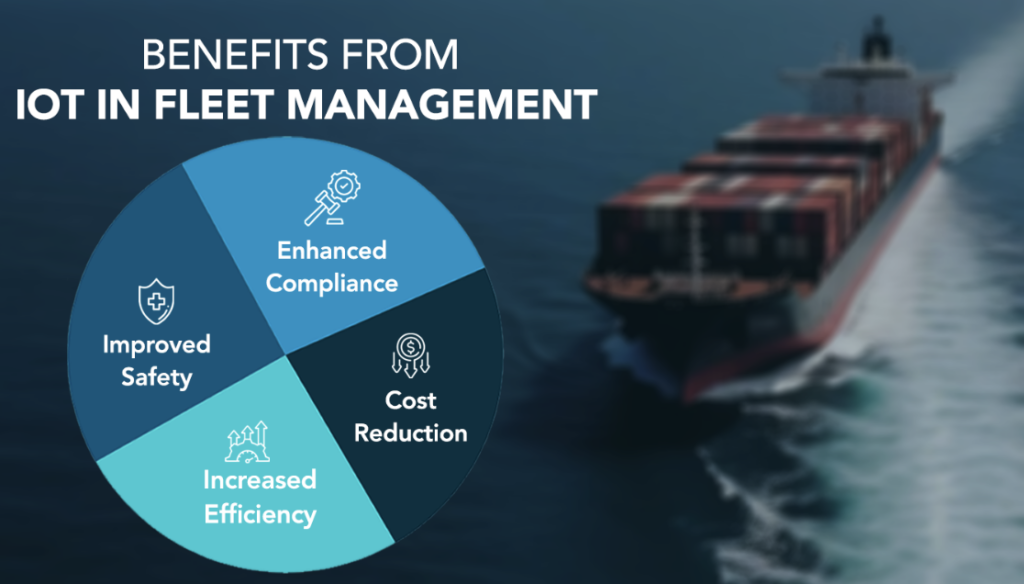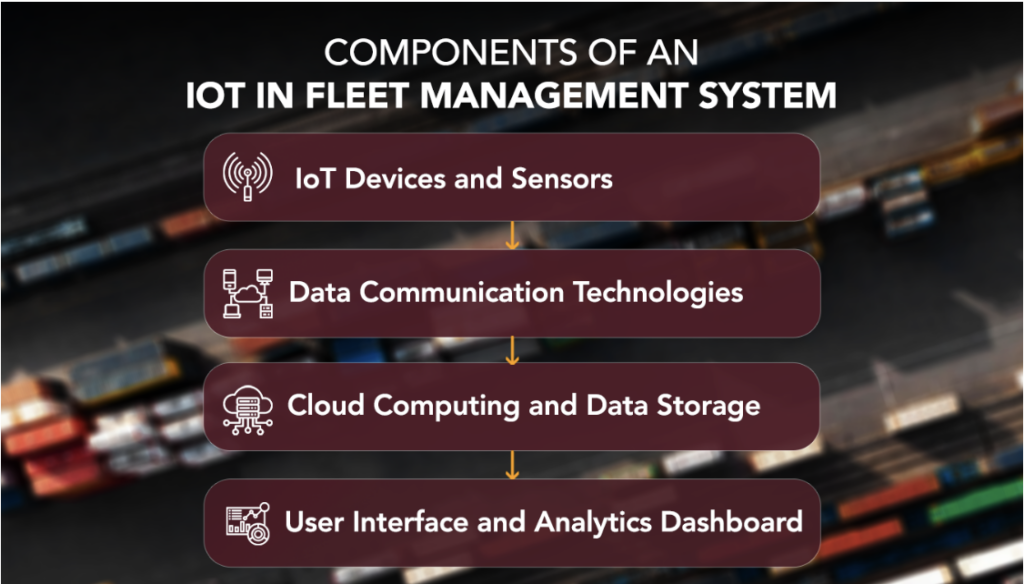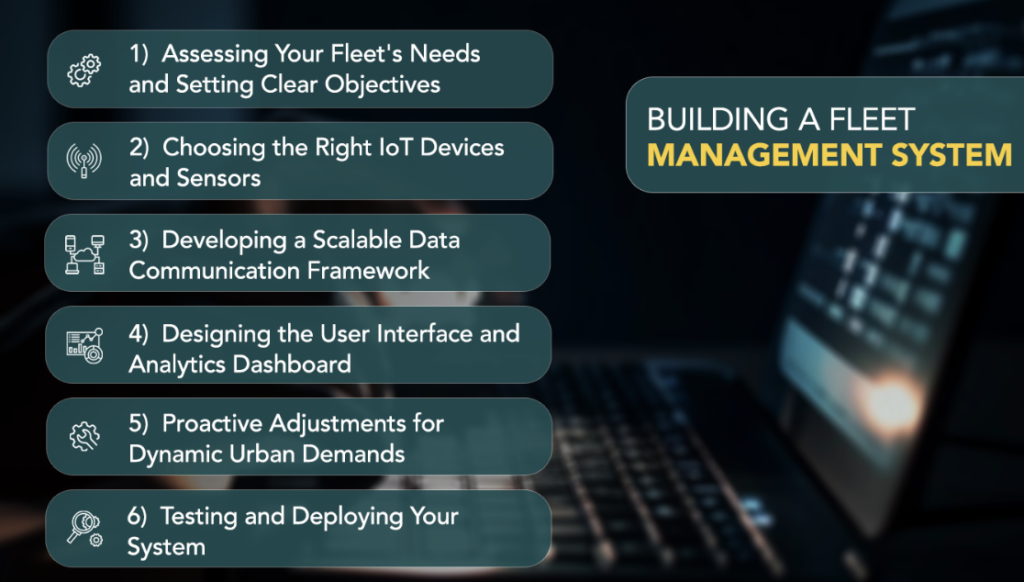How to Build a Fleet Management System Using IoT
 13 May 2024
13 May 2024? Listen to the Summary of this article in Audio
Envision a platform transforming fleet management with real-time, data-informed decisions. This enables seamless logistics coordination with a simple touch. The current era introduces a groundbreaking approach to fleet management through IoT. This innovation presents real-time management solutions, ushering in a new age of efficiency and connectivity.
IoT-enabled tracking propels fleet operations into groundbreaking effectiveness. It gives businesses the chance to refine operations, cut costs, and embrace smart monitoring technologies confidently. This leap forward equips companies to navigate the future of transportation management seamlessly.

Key Takeaways
- Understanding IoT and its transformational role in fleet management.
- Key advantages of real-time fleet management systems.
- The importance of connected fleet technology for modern businesses.
- How IoT-enabled fleet tracking offers a competitive edge.
- Essential components of a successful fleet monitoring platform.
Understanding Fleet Management: Definitions and Importance
Fleet management is vital in logistics and transportation worldwide. It oversees commercial vehicles to ensure they operate efficiently and comply with regulations. A sophisticated fleet management system using IoT is now crucial, offering unmatched oversight and data analytics.
Thanks to telematics for fleet management, companies can enhance vehicle use and enforce safety protocols. A vehicle telematics solution helps manage effectively, cutting costs by monitoring fuel and maintenance. These systems enable real-time, informed decision-making.
Key areas impacted by IoT fleet management technology include:
- Automated and predictive maintenance and diagnostics
- Fuel systems that monitor and reduce consumption
- Handling from acquisition to disposal or resale of vehicles
- Driver management for safety and training
- Compliance with changing regulations and standards
These aspects are crucial for a modern fleet’s management. IoT devices and software analysis offer insights that improve fleet performance and extend its life.
Moreover, IoT enhances vehicle-to-infrastructure communication. It creates a connected logistical network, revolutionizing global transportation systems.
“IoT technology is reshaping the dynamics of fleet management, allowing for a more cohesive, responsive, and data-driven approach. It’s the reinvention of industry standards.”
Organizations are thus eager to incorporate IoT, staying ahead competitively. This integration marries IoT innovation with vehicle systems, emphasizing efficiency and smarter fleet management.
The Role of IoT in Fleet Management
The adoption of IoT in fleet management marks a pivotal shift in the sector’s evolution. Connected vehicle technologies provide real-time monitoring capabilities, transforming fleet management. This holistic oversight ensures vehicle health and driver behavior are meticulously tracked and improved.
Integrating IoT in fleet management offers detailed, actionable data. As fleets grow more connected, managing complexity lessens significantly. This enables a more analytical, proactive fleet management approach.
IoT devices are part of a broader, connected ecosystem that boosts fleet vehicle operations. Sensors in the fleet collect various data points, from tracking locations to monitoring conditions. This information supports both immediate management decisions and long-term strategy.
| IoT Capability | Benefits for Fleet Management |
|---|---|
| Vehicle Diagnostics | Proactive maintenance alerts, vehicle health reports, and downtime reduction. |
| Asset Tracking | Improved asset utilization, theft prevention, and inventory management. |
| Data Analytics | Behavioral insights, performance benchmarks, and operational efficiencies. |
| Eco-Driving Features | Fuel savings, reduced carbon footprint, and enhanced CSR. |
| Compliance Management | Automated logs, regulatory adherence, and simplified reporting. |
IoT’s role in fleet management surpasses basic GPS tracking. Connected solutions now provide a range of intelligent features, like V2X communications. These IoT advancements ensure comprehensive connectivity, enhancing safety and efficiency in transport systems.

IoT is fundamental to modern fleet management. It empowers operators with dynamic management strategies, reducing risks and costs. In our rapidly advancing technological landscape, IoT strategies will become essential for competitive, market-responsive fleets.
Key Components of a Fleet Management System Using IoT
An efficient IoT-based fleet management system is built on key components. Each component is vital for seamless operation, offering real-time insights for strategic decisions.

1. IoT Devices and Sensors for Vehicle Tracking
At the heart of IoT fleet solutions are IoT devices and sensors. These devices are installed on vehicles to gather important data, such as location and speed. A GPS tracking system enhances these devices, providing detailed tracking. This tracking is critical for any top-tier fleet management system.
2. Data Communication Technologies: Options and Considerations
Data communication technologies are essential for transmitting information. They connect vehicles to a central monitoring system. Technologies like Wi-Fi, GSM, and LoRaWAN are used to transmit data efficiently. Choosing the right technology involves considering range, bandwidth, and security to ensure a strong IoT-based fleet management infrastructure.
3 Cloud Computing and Data Storage Solutions
Cloud computing has transformed data management in fleet management. It provides scalable storage and powerful analytics. This key part lets managers use predictive analytics and access data remotely, encouraging a proactive approach.
4. User Interface and Experience: Dashboard and Analytics Tools
The user interface completes the IoT-based fleet management system. It usually comes as a dashboard that simplifies IoT data into actionable insights. With powerful analytics tools, fleet managers can make fast, informed decisions.
Our experienced developers can create a customized, IoT-powered fleet management platform tailored to your business needs.
Step-by-Step Guide to Building Your Fleet Management System
Starting the journey to create a fleet management system can revolutionize operational efficiency. We’ll guide you through essential steps for a solution that meets your fleet’s needs.

Step 1: Assessing Your Fleet’s Needs and Setting Clear Objectives
Start by analyzing your fleet operations to identify specific needs. Setting clear, achievable goals is crucial for your system’s development. Focus on priorities like fuel optimization and driver safety to improve profitability.
Step 2: Choosing the Right IoT Devices and Sensors
Selecting IoT devices requires attention to durability, precision, and system compatibility. These devices must provide instant data on vehicle condition, location, and driver actions, aiding in better decision-making.
Step 3: Developing a Scalable Data Communication Framework
Scalable data communication is vital for managing more information as your fleet expands. Choose technology that ensures secure data exchange and adapts to new devices seamlessly.
Step 4: Implementing Cloud Storage and Data Management Solutions
Cloud storage is foundational for data management today, providing safe, accessible, and expandable data storage. Effective cloud implementation eases data analysis and sharing.
Step 5: Designing the User Interface and Analytics Dashboard
The UI and analytics should make complex data accessible. A thoughtfully designed dashboard offers essential insights quickly and makes in-depth analysis straightforward.
Step 6: Testing and Deploying Your System
Thorough testing fine-tunes your system for reliable performance upon deployment. Testing under various conditions helps uncover improvements, ensuring a successful start.
Let’s now visualize these stages and their objectives in a table:
| Step | Focus Area | Outcome |
|---|---|---|
| 1. Needs Assessment | Identify specific needs and set objectives | Foundation for a targeted fleet solution |
| 2. IoT Device Selection | Select adaptable and robust IoT devices | Reliable data collection |
| 3. Data Communication | Develop scalable data communication protocols | Efficient and secure data transfer |
| 4. Cloud Storage | Implement cloud solutions for data management | Scalable and resilient data storage |
| 5. UI/Analytics Design | Design intuitive interface and analytics platform | Streamlined user experience and insight generation |
| 6. Testing & Deployment | Conduct thorough testing of the system | A robust and operative fleet management system |
This guide outlines steps to building an effective fleet management system using advanced technology. By adhering to these steps, your system will become a crucial asset for fleet optimization.
Let our experts guide you through the process of implementing an IoT fleet management system to drive efficiency and cost savings.
Integrating Advanced Technologies into Your Fleet Management System
The integration of state-of-the-art technologies into fleet management systems signifies a critical evolution. This advancement leads to more adaptive, proactive, and efficient management of fleet operations. Utilizing cutting-edge analytics and real-time data, fleet operators gain unparalleled control and understanding of their assets and workforce.
Machine Learning for Predictive Maintenance and Operations
The implementation of machine learning in fleet management heralds a significant transformation. It enables predictive maintenance by assessing both historical and real-time data. These algorithms can predict potential vehicle issues, triggering maintenance actions before significant disruptions occur. Such measures notably reduce downtime and enhance the lifespan of fleet assets.
Incorporating GPS and Real-Time Tracking for Enhanced Visibility
Integrating GPS fleet management solutions and real-time fleet tracking is vital for contemporary fleets. These technologies are essential for locating vehicles, optimizing travel routes, and observing driver behavior. They ensure operational efficiency and safety. Additionally, real-time tracking allows managers to stay updated on fleet operations, promoting a more adaptable management approach.
Utilizing Big Data Analytics for Fleet Optimization
The importance of big data analytics in fleet management is paramount. By analyzing extensive datasets from fleet activities, analytics can uncover patterns and offer valuable insights. These insights facilitate better fuel management, route planning, and overall fleet efficiency. Consequently, they guide leaders to refine operations and enhance profitability through strategic decision-making.
- Predictive analytics propelling maintenance scheduling and resource allocation
- Enhanced dispatching and routing decisions driven by GPS tracking
- Cost reductions and productivity advancements via big data-driven optimizations
Security Considerations for IoT-based Fleet Management Systems
The integration of Internet of Things (IoT) devices into fleet management intensifies the need for cybersecurity. It’s essential to predict and defend against vulnerabilities to protect the network from cyber-attacks. This proactive approach is key in maintaining the integrity of the IoT framework.
Identifying and Mitigating Potential Cybersecurity Risks
Conducting frequent risk assessments is crucial in identifying potential threats within the fleet management ecosystem. Once identified, implementing security measures such as firewalls and secure credential management safeguards the system. It’s about staying a step ahead of cyber threats.
Implementing Data Encryption and Access Controls
Data encryption guarantees the security of information exchanged between vehicles and management systems. Encrypting all data prevents unauthorized access. Moreover, employing access controls ensures that only verified users can access or modify system data.
Regular System Updates and Patch Management
Adopting a disciplined approach to system updates and patches is vital for security. It’s about consistently updating IoT devices and back-end systems. Ensuring that all components are current enhances defense against emerging threats.
| Cybersecurity Measures | Implementation Strategy | Benefits |
|---|---|---|
| Risk Assessment and Management | Periodic analysis and proactive stance | Identifies vulnerabilities early |
| Data Encryption | High-level encryption standards for data at rest and in transit | Protects against data breaches |
| Access Controls | Strict authentication protocols for device interaction | Limits exposure to authorized personnel |
| System Updates and Patching | Regular schedule for updates and patches | Ensures defenses are current |
Our cybersecurity specialists can help you build a robust, secure IoT fleet management platform to protect your data and operations.
Challenges and Limitations of Building an IoT-based Fleet Management Systems
Starting the development of an IoT-based fleet management system presents numerous complexities. The primary challenge lies in integrating diverse IoT devices seamlessly. Achieving true interoperability is crucial, as these components must work independently and together. This necessitates carefully choosing compatible technologies and planning for a unified system operation. Furthermore, these technical hurdles include creating a robust framework. This framework must manage vast data streams from the IoT devices while ensuring information security and integrity.
Technical Challenges and How to Overcome Them
Effectively addressing IoT fleet management challenges requires staying current with technological trends and strategic planning. To overcome these obstacles, a deep understanding of both hardware and software is needed. Plus, there must be a willingness to embrace new technologies. By conducting regular system evaluations and integrating the latest IoT solutions, one can prevent technical challenges from hampering system efficiency.
Scalability and Maintenance Issues
Scalability is crucial for the long-term success of an IoT-based fleet management solution. The system must easily accommodate more units and scale operations as the fleet grows. Forward-thinking during the initial stages can prevent future systemic overloads. In addition, ongoing maintenance and regular updates are essential. They ensure all components function optimally, supporting a sustainable and efficient fleet management system.
Navigating Regulatory and Compliance Hurdles
Compliance with industry regulations is fundamental and must be incorporated from the system’s inception. Laws often change and vary by location, making compliance complex. The best approach to compliance involves constant vigilance. Procedures should be in place to keep the system aligned with the latest regulations. This protects operators from legal issues and boosts fleet operation security.
FAQ
What is a fleet management system using IoT?
A fleet management system using IoT integrates technology to oversee commercial vehicle fleets. It employs connected devices and sensors. These devices provide real-time tracking, telematics for management, predictive maintenance, and advanced technology.
How does IoT enhance fleet management operations?
IoT technology permits real-time monitoring of fleets and enhances driver behavior via telematics. It also optimizes tracking and provides insights for improved decision-making. Essentially, IoT yields better operational efficiency and lowers costs.
What are the key components of a fleet management system using IoT?
The main elements are IoT devices and sensors for tracking, secure communication technologies, and cloud solutions for data management. Additionally, a user-friendly interface with an analytics dashboard is crucial for effective monitoring and decisions.
What steps should be taken to build an IoT-based fleet management system?
To construct an IoT-based system, start by assessing your fleet’s needs. Choose suitable IoT devices and sensors and create a scalable communication framework. Then implement cloud storage, design an intuitive interface, and conduct extensive tests before deployment.
How can machine learning and GPS tracking benefit fleet management?
Machine learning foresees maintenance needs, minimizing downtime, and GPS tracking enhances fleet visibility in real time. This enhances routes, reduces fuel use, and boosts efficiency with technologies like machine learning and fleet tracking.
What security measures are important for IoT-based fleet management systems?
Critical security protocols include identifying cyber threats and enforcing strong encryption. Establishing strict access controls, conducting frequent security reviews, and ensuring system updates are also pivotal. Educating staff on cybersecurity prevention and response is essential.
What challenges do companies face when building an IoT-based fleet management system?
Companies encounter hurdles like ensuring device interoperability and system scalability with fleet expansion. Regular maintenance for efficiency and compliance with regulatory standards are also significant to address legal and operational challenges.










